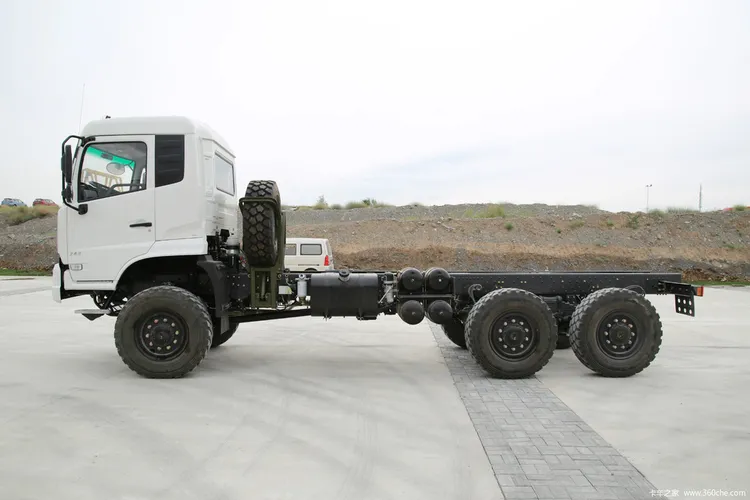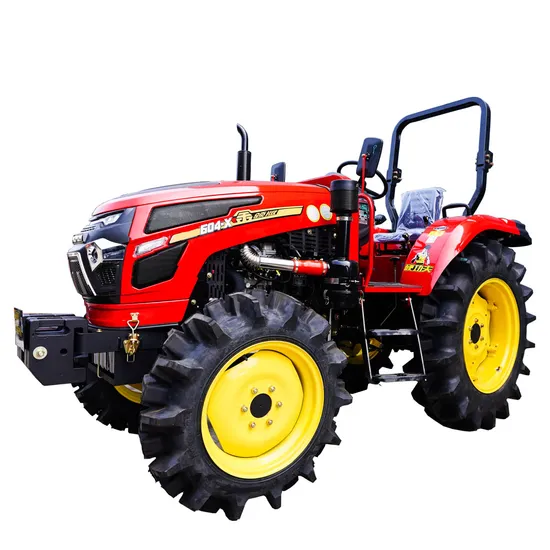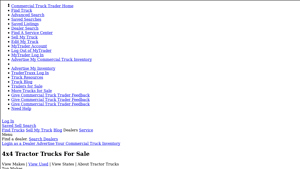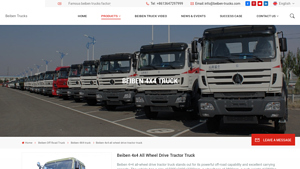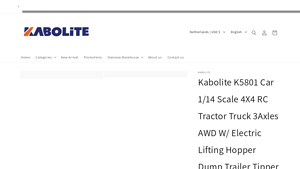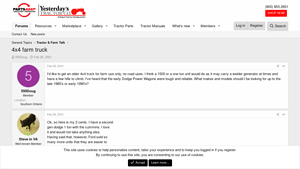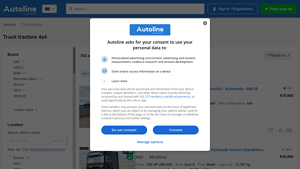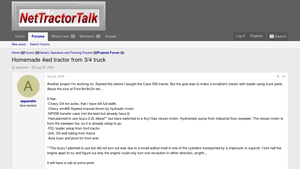Introduction: Navigating the Global Market for 4×4 Tractor Truck
In today’s rapidly evolving logistics landscape, sourcing reliable 4×4 tractor trucks poses a significant challenge for international B2B buyers. With diverse geographical terrains and varying operational requirements across regions such as Africa, South America, the Middle East, and Europe, the need for a robust and versatile vehicle is paramount. This comprehensive guide delves into the intricacies of the global market for 4×4 tractor trucks, offering insights into different types, their applications in various industries, and essential supplier vetting processes.
Understanding the nuances of pricing, maintenance costs, and import regulations is critical for making informed purchasing decisions. This guide equips B2B buyers with actionable strategies to navigate the complexities of sourcing, ensuring that they can secure vehicles that not only meet their operational needs but also align with their budgetary constraints. From evaluating the latest models to comprehending the importance of warranty and service agreements, this resource is designed to empower businesses to make educated choices that enhance their logistics capabilities.
By addressing key challenges and providing expert insights, this guide serves as an invaluable tool for businesses looking to invest in 4×4 tractor trucks, ultimately facilitating smoother operations and greater efficiency in their supply chains.
Understanding 4×4 Tractor Truck Types and Variations
| Type Name | Key Distinguishing Features | Primary B2B Applications | Brief Pros & Cons for Buyers |
|---|---|---|---|
| Heavy-Duty 4×4 Tractor | High towing capacity, powerful engines, rugged build | Construction, agriculture | Pros: Exceptional durability, high payload capacity. Cons: Higher fuel consumption, often more expensive. |
| Medium-Duty 4×4 Tractor | Moderate towing capacity, versatile, often lighter | Municipal services, logistics | Pros: Balance of power and efficiency. Cons: Limited heavy-duty applications. |
| 4×4 Yard Spotter Truck | Designed for maneuverability, lower height, specialized use | Warehousing, distribution centers | Pros: Excellent for tight spaces, easy to operate. Cons: Limited to yard operations, not for long hauls. |
| 4×4 Conventional Day Cab | Traditional cab design, can be customized for various needs | Freight transport, regional delivery | Pros: Versatile, customizable, comfortable for long hauls. Cons: Less off-road capability compared to specialized models. |
| 4×4 Agricultural Tractor | Features specialized attachments, all-terrain capability | Farming, land management | Pros: Highly adaptable for different farming tasks. Cons: May require additional investments in attachments. |
What Are the Characteristics of Heavy-Duty 4×4 Tractors?
Heavy-duty 4×4 tractors are engineered to handle substantial loads and challenging terrains, making them ideal for industries such as construction and agriculture. With powerful engines and robust frames, these tractors excel in towing and hauling, often equipped with advanced features like hydraulic systems for attachments. For B2B buyers, the key consideration is the balance between initial investment and long-term operational costs, including maintenance and fuel efficiency.
How Do Medium-Duty 4×4 Tractors Serve Various Industries?
Medium-duty 4×4 tractors bridge the gap between light and heavy-duty models, offering versatility suitable for municipal services and logistics. These tractors typically feature a moderate towing capacity and can be outfitted with various attachments for different tasks. Buyers should evaluate their specific operational needs, as these tractors provide a cost-effective solution without compromising on performance, making them suitable for a variety of applications.
Why Choose a 4×4 Yard Spotter Truck?
4×4 yard spotter trucks are specifically designed for maneuverability in confined spaces, making them essential for warehousing and distribution operations. With a lower height and specialized features, these trucks facilitate quick and efficient movement of trailers within yards. For businesses focused on logistics, investing in yard spotters can enhance operational efficiency, though buyers should note their limitations in long-distance transport.
What Makes 4×4 Conventional Day Cabs a Popular Choice?
4×4 conventional day cabs are characterized by their traditional design and versatility, allowing for customization based on specific transport needs. They are widely used in freight transport and regional delivery, providing comfort for long-haul drivers. B2B buyers should consider the trade-off between off-road capabilities and on-road comfort, as these trucks are designed primarily for highway use.
How Do 4×4 Agricultural Tractors Enhance Farming Operations?
4×4 agricultural tractors are tailored for farming applications, equipped with specialized attachments for tasks such as plowing, tilling, and hauling. Their all-terrain capability allows them to navigate diverse landscapes, making them indispensable for land management. When purchasing, businesses should assess the compatibility of attachments and the tractor’s adaptability to various farming activities, ensuring a worthwhile investment in agricultural productivity.
Key Industrial Applications of 4×4 Tractor Truck
| Industry/Sector | Specific Application of 4×4 Tractor Truck | Value/Benefit for the Business | Key Sourcing Considerations for this Application |
|---|---|---|---|
| Agriculture | Towing and transporting heavy farming equipment | Enhances operational efficiency and productivity | Consider terrain compatibility and power requirements |
| Construction | Heavy-duty hauling and site preparation | Reduces downtime and improves project timelines | Evaluate load capacity and durability under harsh conditions |
| Logistics & Supply Chain | Off-road transportation of goods in remote areas | Expands delivery reach and improves logistics efficiency | Assess fuel efficiency and maintenance support availability |
| Mining | Material transport in rugged terrains | Increases safety and operational reliability | Focus on engine power and adaptability to extreme conditions |
| Emergency Services | Rapid response and rescue operations | Enhances emergency response times and accessibility | Ensure vehicle reliability and ease of maintenance |
How is the 4×4 Tractor Truck Used in Agriculture?
In the agriculture sector, 4×4 tractor trucks are vital for towing and transporting heavy farming equipment, such as plows and harvesters. Their robust design and four-wheel drive capability allow them to navigate challenging terrains, ensuring that farmers can operate efficiently in various field conditions. For international buyers, particularly in regions like Africa and South America, sourcing tractors with the right engine power and compatibility for local terrains is crucial. This investment enhances operational efficiency, enabling farmers to maximize productivity during critical planting and harvesting seasons.
What Role Does the 4×4 Tractor Truck Play in Construction?
In construction, 4×4 tractor trucks are instrumental for heavy-duty hauling and site preparation. They can transport materials like gravel, sand, and equipment across rough job sites, significantly reducing downtime. For buyers in regions with diverse climates, such as Europe and the Middle East, it is essential to evaluate the truck’s load capacity and durability, ensuring it can withstand harsh working conditions. This capability not only streamlines project timelines but also enhances safety by allowing for more reliable material handling.
How is the 4×4 Tractor Truck Beneficial in Logistics & Supply Chain?
The logistics and supply chain industry benefits from 4×4 tractor trucks by utilizing them for off-road transportation of goods, especially in remote areas lacking proper road infrastructure. Their versatility allows businesses to expand their delivery reach, improving logistics efficiency. For international buyers, particularly in developing regions, assessing fuel efficiency and maintenance support is vital to ensure long-term operational viability. Investing in a reliable 4×4 tractor truck can significantly enhance supply chain resilience and responsiveness.
Why is the 4×4 Tractor Truck Essential in Mining Operations?
In mining, 4×4 tractor trucks are essential for transporting materials across rugged terrains, where traditional vehicles may struggle. Their powerful engines and sturdy build enhance safety and operational reliability, allowing for the efficient movement of heavy loads. For international buyers, especially in regions like Africa, it is critical to focus on the truck’s adaptability to extreme conditions and its ability to handle various types of terrain. This capability not only optimizes productivity but also minimizes operational risks in challenging environments.
How Does the 4×4 Tractor Truck Support Emergency Services?
4×4 tractor trucks play a crucial role in emergency services by facilitating rapid response and rescue operations in areas that may be inaccessible by standard vehicles. Their robust construction and four-wheel drive capabilities ensure that emergency responders can reach victims quickly, enhancing overall response times. For B2B buyers in sectors like healthcare and disaster management, ensuring vehicle reliability and ease of maintenance is paramount. Investing in a reliable 4×4 tractor truck can significantly improve emergency service effectiveness, ultimately saving lives and resources.
3 Common User Pain Points for ‘4×4 Tractor Truck’ & Their Solutions
Scenario 1: Difficulty in Maneuvering in Challenging Terrain
The Problem:
B2B buyers in agriculture or construction industries often encounter difficulties in maneuvering standard trucks in rugged terrains, especially in regions like Africa or South America, where road conditions can be unpredictable. The lack of adequate traction and stability can lead to delays in operations, increased fuel consumption, and potential damage to the vehicle, resulting in costly downtime. Buyers may feel overwhelmed when trying to select the right 4×4 tractor truck that can withstand such challenges.
The Solution:
To effectively address this issue, buyers should focus on sourcing 4×4 tractor trucks that come equipped with advanced traction control systems and differential locks. These features enhance the vehicle’s ability to navigate through mud, sand, and rocky surfaces, ensuring reliable performance in harsh conditions. Additionally, conducting thorough research on various models’ off-road capabilities is crucial. Buyers can leverage industry-specific forums or consult with manufacturers to identify the best options tailored to their operational needs. Prioritizing trucks with higher ground clearance and robust suspension systems will also contribute to improved maneuverability, allowing for seamless operation in challenging environments.
Scenario 2: High Maintenance Costs and Downtime
The Problem:
Another common pain point for B2B buyers is the high maintenance costs associated with 4×4 tractor trucks, which can significantly impact the total cost of ownership. Frequent repairs and servicing lead to extended downtimes, affecting productivity and project timelines. This issue is particularly pressing for businesses in the Middle East and Europe, where operational efficiency is paramount, and unexpected costs can derail budgets.
The Solution:
To mitigate maintenance costs, buyers should consider investing in 4×4 tractor trucks known for their reliability and ease of serviceability. Before making a purchase, it is advisable to review the maintenance records and warranty options provided by the manufacturers. Choosing models that have readily available spare parts and a strong support network can also minimize downtime during repairs. Establishing a regular maintenance schedule and training operators on basic troubleshooting can further reduce the frequency of costly repairs. Buyers might also consider leasing options for newer models, which often come with maintenance packages included, ensuring predictable costs and access to the latest technology.
Scenario 3: Inadequate Load Capacity and Versatility
The Problem:
B2B buyers often face challenges regarding the load capacity and versatility of 4×4 tractor trucks, particularly when their operations require transporting various types of cargo. This is especially true in industries such as logistics and agriculture, where the need for adaptability can change rapidly. Buyers may find that their chosen vehicles are either underpowered for heavy loads or lack the necessary configurations to handle diverse cargo efficiently.
The Solution:
To overcome this challenge, buyers should carefully evaluate the load capacity specifications of 4×4 tractor trucks before purchasing. It is essential to identify models that offer customizable configurations, such as adjustable hitch systems and modular designs that can accommodate different types of trailers or attachments. Engaging with manufacturers to discuss specific operational needs can lead to tailored solutions that enhance versatility. Additionally, considering trucks with powerful engines and robust frames will ensure they can handle higher loads without compromising performance. Conducting a cost-benefit analysis on various configurations can also guide buyers in selecting the best truck for their diverse operational demands, ensuring they remain competitive in their respective markets.
Strategic Material Selection Guide for 4×4 Tractor Truck
When selecting materials for 4×4 tractor trucks, it is essential to consider their performance characteristics, cost implications, and suitability for diverse operating environments. The following analysis focuses on four common materials used in the construction of 4×4 tractor trucks: steel, aluminum, composite materials, and rubber. Each material has unique properties that affect the overall performance and durability of the vehicle, making them crucial considerations for international B2B buyers.
What Are the Key Properties of Steel in 4×4 Tractor Trucks?
Steel is one of the most widely used materials in the manufacturing of 4×4 tractor trucks due to its excellent strength-to-weight ratio and durability. It can withstand high temperatures and pressures, making it suitable for heavy-duty applications. Steel also offers good corrosion resistance when treated with protective coatings, which is essential for trucks operating in harsh environments, such as those found in Africa and South America.
Pros: Steel is relatively inexpensive and readily available, making it a cost-effective choice for manufacturers. Its high durability ensures a long lifespan, reducing the need for frequent replacements.
Cons: The primary drawback of steel is its weight, which can affect fuel efficiency and overall performance. Additionally, it may require additional treatments to enhance corrosion resistance, adding to manufacturing complexity.
How Do Aluminum Materials Benefit 4×4 Tractor Trucks?
Aluminum is increasingly popular in the automotive industry due to its lightweight properties, which contribute to improved fuel efficiency and handling. It has excellent corrosion resistance and can withstand a range of temperatures, making it suitable for diverse climates.
Pros: The lightweight nature of aluminum allows for better payload capacity and fuel economy. Its resistance to corrosion reduces maintenance costs and extends the vehicle’s lifespan.
Cons: Aluminum is generally more expensive than steel, which can increase production costs. Additionally, its lower strength compared to steel may necessitate thicker sections to achieve similar performance, potentially offsetting weight savings.
What Role Do Composite Materials Play in 4×4 Tractor Trucks?
Composite materials, such as fiberglass and carbon fiber, are becoming more prevalent in the automotive sector. They offer high strength-to-weight ratios and excellent resistance to corrosion and temperature fluctuations.
Pros: Composites can significantly reduce the overall weight of the vehicle, enhancing fuel efficiency and performance. They also provide superior resistance to environmental factors, making them ideal for trucks operating in extreme conditions.
Cons: The primary limitation of composites is their higher cost compared to traditional materials like steel and aluminum. Additionally, manufacturing processes for composites can be more complex, requiring specialized equipment and expertise.
Why is Rubber Important for 4×4 Tractor Trucks?
Rubber is essential for various components of 4×4 tractor trucks, particularly in tires, seals, and suspension systems. It provides excellent flexibility and shock absorption, contributing to the vehicle’s overall performance and comfort.
Pros: Rubber offers superior traction, which is critical for off-road capabilities. Its flexibility allows for better handling and ride quality, particularly in rugged terrains.
Cons: Rubber can degrade over time due to exposure to UV light and ozone, necessitating regular maintenance and replacement. Additionally, high-quality rubber materials can be costly, impacting the overall budget for truck production.
Summary of Material Selection Considerations for International Buyers
When selecting materials for 4×4 tractor trucks, international B2B buyers must consider compliance with local standards such as ASTM, DIN, and JIS. Understanding material properties and their implications for performance, cost, and manufacturing complexity is crucial, especially in regions with varying environmental conditions.
| Material | Typical Use Case for 4×4 Tractor Truck | Key Advantage | Key Disadvantage/Limitation | Relative Cost (Low/Med/High) |
|---|---|---|---|---|
| Steel | Chassis and frame components | High strength and durability | Heavy weight affecting fuel efficiency | Medium |
| Aluminum | Body panels and structural elements | Lightweight, improving fuel efficiency | Higher cost and lower strength compared to steel | High |
| Composite | Bodywork and non-structural components | Excellent corrosion resistance and weight savings | Higher manufacturing complexity and cost | High |
| Rubber | Tires and suspension components | Superior traction and shock absorption | Degradation over time requiring maintenance | Medium |
This strategic material selection guide provides actionable insights for B2B buyers, helping them make informed decisions that align with their operational needs and budgetary constraints.
In-depth Look: Manufacturing Processes and Quality Assurance for 4×4 Tractor Truck
What Are the Main Stages of Manufacturing 4×4 Tractor Trucks?
The manufacturing process of 4×4 tractor trucks involves several critical stages, each contributing to the vehicle’s overall performance, durability, and compliance with international standards. Understanding these stages can help B2B buyers assess the quality of potential suppliers.
Material Preparation: Ensuring Quality from the Start
The first stage, material preparation, is crucial for the integrity of the final product. High-strength steel and aluminum alloys are commonly used due to their favorable strength-to-weight ratios. Suppliers must ensure that raw materials meet specified standards, such as ASTM or ISO certifications. This stage also involves cutting and shaping materials into specific components, such as chassis frames and axles. Buyers should inquire about the sourcing of materials, as quality raw materials are foundational to a robust manufacturing process.
Forming: Shaping Components for Durability
During the forming stage, raw materials undergo processes such as stamping, bending, and welding to create the various components of the tractor truck. Advanced techniques like computer numerical control (CNC) machining ensure precision in forming parts, which is crucial for maintaining tolerances. The use of robotics in welding enhances consistency and reduces human error, leading to higher-quality joints. B2B buyers should look for manufacturers that utilize modern technologies and techniques, as this often indicates a commitment to quality and innovation.
Assembly: Integrating Components for Functionality
The assembly stage is where the individual components come together to form the complete tractor truck. This involves several sub-steps, including fitting the engine, transmission, and drivetrain, as well as installing electrical systems and cab interiors. A systematic approach, often based on lean manufacturing principles, is crucial during this phase to minimize waste and enhance efficiency. Quality assurance checkpoints are integrated throughout the assembly line to ensure that each component meets specifications before moving to the next stage. Buyers should ask potential suppliers about their assembly processes and how they ensure consistent quality.
Finishing: Final Touches and Quality Assurance
The finishing stage involves painting, coating, and applying decals to the tractor truck. This not only enhances aesthetic appeal but also provides protective layers against corrosion and environmental factors. Manufacturers often use environmentally friendly coatings to comply with international regulations. Additionally, this stage includes final inspections and tests to ensure that the truck meets performance standards. B2B buyers should request information on finishing techniques and any environmental compliance measures taken by the manufacturer.
What Quality Assurance Measures Are Essential for 4×4 Tractor Trucks?
Quality assurance is integral to the manufacturing process of 4×4 tractor trucks, ensuring that they meet both international and industry-specific standards. Understanding these measures can help B2B buyers evaluate the reliability of potential suppliers.
What International Standards Apply to 4×4 Tractor Truck Manufacturing?
International standards such as ISO 9001 play a vital role in quality management systems. This standard emphasizes a process-based approach to ensure consistent quality in products and services. Additionally, industry-specific certifications like CE (Conformité Européenne) and API (American Petroleum Institute) are critical for 4×4 tractor trucks, especially for those intended for specific markets or applications. Buyers should verify that suppliers possess relevant certifications and understand the implications of these standards in terms of product quality and safety.
How Are Quality Control Checkpoints Implemented?
Manufacturers typically implement several quality control (QC) checkpoints throughout the production process. Incoming Quality Control (IQC) involves inspecting raw materials upon arrival to ensure they meet specifications. In-Process Quality Control (IPQC) occurs during the assembly phase, where components are checked for conformity to design and performance standards. Finally, Final Quality Control (FQC) is conducted once the truck is assembled, ensuring that the entire vehicle meets quality and safety requirements. B2B buyers should inquire about the specific QC measures in place and request documentation of these processes.
What Common Testing Methods Are Used in Quality Assurance?
Common testing methods for 4×4 tractor trucks include dynamic testing, load testing, and environmental testing. Dynamic testing evaluates the vehicle’s performance under various operating conditions, while load testing ensures that structural components can handle expected loads. Environmental testing assesses the truck’s resilience to different weather conditions, which is particularly important for markets in Africa and South America. Buyers should ask suppliers for details on the testing methods used and any certifications obtained from third-party testing organizations.
How Can B2B Buyers Verify Supplier Quality Control?
Verifying a supplier’s quality control measures is essential for B2B buyers seeking reliable 4×4 tractor trucks. Here are some effective methods to ensure that suppliers adhere to high-quality standards.
What Are the Best Practices for Conducting Audits?
Regular audits of manufacturing facilities can provide valuable insights into a supplier’s quality management practices. Buyers should establish a schedule for on-site audits, focusing on critical areas such as material sourcing, production processes, and QC measures. During audits, it is essential to review documentation related to certifications, inspection reports, and corrective actions taken for any identified issues. This proactive approach helps ensure that suppliers maintain compliance with international standards.
How Can Buyers Access Quality Reports?
Many manufacturers provide quality reports detailing their production processes, inspections, and test results. Buyers should request these reports as part of their due diligence process. These documents can offer transparency regarding the supplier’s quality management system and highlight any areas of concern or improvement. Additionally, third-party certifications can serve as a valuable supplement to internal quality reports, providing an unbiased assessment of the supplier’s practices.
What Nuances Should International Buyers Consider?
International B2B buyers, particularly from regions like Africa, South America, the Middle East, and Europe, should be aware of specific nuances in quality control. Differences in regulations, market expectations, and environmental standards can impact the quality assurance processes of manufacturers. Buyers should conduct thorough research on local regulations and industry standards in their target markets, ensuring that suppliers can meet these requirements. Establishing clear communication with suppliers regarding expectations and compliance can further enhance the partnership.
Conclusion: Prioritizing Quality in 4×4 Tractor Truck Procurement
The manufacturing processes and quality assurance measures for 4×4 tractor trucks are complex and multifaceted. For international B2B buyers, understanding these processes is crucial for making informed procurement decisions. By focusing on material preparation, forming, assembly, and finishing, alongside robust quality assurance protocols, buyers can ensure they partner with manufacturers committed to delivering high-quality, reliable vehicles tailored to their specific market needs.
Practical Sourcing Guide: A Step-by-Step Checklist for ‘4×4 Tractor Truck’
Introduction
In the competitive landscape of logistics and transportation, procuring a reliable 4×4 tractor truck is crucial for operational efficiency. This guide provides a step-by-step checklist to help B2B buyers make informed decisions, ensuring that the vehicles acquired meet both technical and operational requirements. By following this structured approach, buyers can mitigate risks and enhance their procurement strategies.
Step 1: Define Your Technical Specifications
Before starting your search, clarify your operational needs. Determine the intended use of the 4×4 tractor truck, including payload capacity, engine specifications, and any specific features required for your business operations.
- Consider the terrain: If your operations involve off-road conditions, prioritize trucks with robust suspension and traction capabilities.
- Evaluate load requirements: Calculate the weight and volume of goods to ensure the truck can handle your logistics needs.
Step 2: Establish Your Budget
Setting a clear budget is essential to avoid overspending and to streamline the procurement process. Include not just the purchase price but also consider financing options, maintenance costs, and insurance.
- Explore financing options: Look into leasing versus buying, and assess what works best for your cash flow and operational model.
- Account for long-term costs: Consider fuel efficiency and potential repair costs to understand the total cost of ownership.
Step 3: Research Potential Suppliers
Conduct thorough research to identify reputable suppliers. Look for companies with a proven track record in the industry and positive reviews from other buyers.
- Request documentation: Ask for company profiles, product catalogs, and case studies to gauge their experience and reliability.
- Network for recommendations: Reach out to industry peers or associations for insights on trusted suppliers.
Step 4: Verify Supplier Certifications
It’s imperative to ensure that suppliers comply with industry standards and regulations. Verify their certifications and accreditations to ensure quality and safety.
- Check for local regulations: Different regions may have specific requirements that suppliers must meet.
- Look for quality certifications: ISO certifications or other relevant industry benchmarks can indicate a commitment to quality.
Step 5: Evaluate Vehicle Condition and History
For used 4×4 tractor trucks, assessing the vehicle’s condition is vital. Request maintenance records, inspection reports, and any warranties offered.
- Conduct a physical inspection: If possible, inspect the truck in person to assess its condition and performance.
- Understand its history: Review previous ownership, accident history, and service records to identify any potential red flags.
Step 6: Negotiate Terms and Conditions
Once you identify a suitable supplier and truck, it’s time to negotiate terms. This includes price, delivery schedules, warranties, and post-sale support.
- Be clear about your needs: Ensure that all your operational requirements are met in the agreement.
- Discuss after-sales support: Clarify what support is available for maintenance and repairs post-purchase.
Step 7: Finalize the Purchase and Arrange Logistics
After agreeing on terms, proceed with the purchase. Arrange for transportation of the truck to your location and ensure all documentation is in order.
- Confirm delivery timelines: Ensure that delivery schedules align with your operational needs.
- Review all contracts: Before signing, double-check all terms to avoid any misunderstandings.
By following this practical sourcing guide, B2B buyers can enhance their procurement processes, ensuring they secure the right 4×4 tractor truck tailored to their specific needs.
Comprehensive Cost and Pricing Analysis for 4×4 Tractor Truck Sourcing
What are the Key Cost Components for 4×4 Tractor Trucks?
The cost structure for sourcing 4×4 tractor trucks is multifaceted, comprising several critical components:
-
Materials: The primary materials include high-strength steel for the chassis, composite materials for bodywork, and various engine components. The quality and origin of these materials significantly influence pricing.
-
Labor: Labor costs vary by region and are impacted by the local wage standards and skill levels. Regions with lower labor costs, such as parts of South America and Africa, may offer competitive pricing, but this must be balanced against potential quality issues.
-
Manufacturing Overhead: This includes costs associated with factory operations, utilities, and administrative expenses. Efficient manufacturing processes can help keep these costs down, leading to more competitive pricing.
-
Tooling: Custom tooling for specific truck configurations can incur substantial upfront costs. Buyers should consider whether these costs are justified based on their expected volume and the potential for customization.
-
Quality Control (QC): Rigorous QC processes ensure that trucks meet safety and performance standards. Investing in quality control can mitigate risks associated with defects, which is particularly important for international buyers facing stringent import regulations.
-
Logistics: Transportation costs for shipping trucks internationally can add significantly to the total cost. Factors such as distance, shipping method, and Incoterms play a crucial role in determining these costs.
-
Margin: Suppliers typically add a profit margin to cover their risks and operational costs. Understanding the typical margins in the industry can help buyers negotiate better deals.
How Do Price Influencers Affect 4×4 Tractor Truck Costs?
Several factors influence the pricing of 4×4 tractor trucks, making it essential for buyers to navigate these variables effectively:
-
Volume and Minimum Order Quantity (MOQ): Bulk purchases often lead to lower per-unit costs. Buyers should evaluate their needs and leverage higher volumes to negotiate better pricing.
-
Specifications and Customization: Unique specifications, such as engine type or additional features, can significantly impact pricing. Customization often leads to increased costs, so it’s crucial to determine which features are essential.
-
Materials and Quality Certifications: Trucks built with premium materials and certified by recognized quality standards (e.g., ISO certifications) may command higher prices. Buyers should assess whether these certifications are necessary for their intended use.
-
Supplier Factors: The reputation and reliability of the supplier can affect pricing. Established suppliers may charge more due to their proven track record, while newer suppliers might offer lower prices to gain market share.
-
Incoterms: The chosen Incoterms (e.g., FOB, CIF) dictate responsibility for shipping costs and risks. Understanding these terms can help buyers manage logistics costs effectively.
What Buyer Tips Can Enhance Cost-Efficiency in 4×4 Tractor Truck Sourcing?
Navigating the complexities of pricing and costs in 4×4 tractor truck sourcing requires strategic planning and negotiation skills:
-
Negotiation: Always engage in negotiations to explore potential discounts, especially for larger orders. Building a relationship with suppliers can also lead to more favorable terms over time.
-
Total Cost of Ownership (TCO): Consider not just the purchase price but the total cost of ownership, which includes maintenance, fuel efficiency, and resale value. Investing in higher-quality trucks may yield savings over time.
-
Pricing Nuances for International Buyers: Understand the market dynamics in your region. For example, buyers from Africa or South America may face different pricing structures than those in Europe. Currency fluctuations, import duties, and local regulations can all impact final costs.
-
Research and Due Diligence: Conduct thorough research on potential suppliers, their pricing structures, and customer feedback. This diligence can help avoid hidden costs and ensure a sound investment.
Conclusion
When sourcing 4×4 tractor trucks, understanding the intricate cost structure, price influencers, and strategic negotiation tactics is paramount for B2B buyers. With careful consideration of these factors, companies can make informed decisions that lead to cost-effective and high-quality truck acquisitions. Remember that indicative prices may vary based on numerous conditions, so always verify current market rates before proceeding with any purchase.
Alternatives Analysis: Comparing 4×4 Tractor Truck With Other Solutions
Introduction: Understanding Alternative Solutions to 4×4 Tractor Trucks
In the landscape of heavy-duty transportation and agricultural logistics, the 4×4 tractor truck stands out as a robust solution for various operational needs. However, businesses seeking efficiency and cost-effectiveness may consider alternative solutions that offer similar capabilities. This section explores viable alternatives, providing a comprehensive comparison to assist B2B buyers in making informed decisions.
| Comparison Aspect | 4X4 Tractor Truck | Alternative 1: All-Terrain Vehicles | Alternative 2: Standard Trucks |
|---|---|---|---|
| Performance | High off-road capability, powerful towing capacity | Good for rough terrain, less towing capacity than tractors | Generally lower off-road capability, but versatile for urban and highway use |
| Cost | Higher initial investment; maintenance costs vary | Moderate initial cost; lower long-term maintenance | Lower upfront cost; variable maintenance based on model and usage |
| Ease of Implementation | Requires specialized training for optimal use | Easier to operate for general use; less training needed | Standard driving skills suffice; widely available |
| Maintenance | Regular maintenance needed for heavy-duty use | Lower maintenance demands; simpler mechanics | Maintenance varies; generally routine but can be costly for heavy-duty models |
| Best Use Case | Ideal for agricultural tasks and construction in rural areas | Suited for light-duty tasks in varied terrains | Best for urban logistics and highway transport |
Detailed Breakdown of Alternatives
What are the Advantages and Disadvantages of All-Terrain Vehicles?
All-terrain vehicles (ATVs) provide a versatile option for businesses needing mobility across rugged landscapes. They excel in environments where 4×4 tractor trucks might be overkill, offering a lighter, more maneuverable option for less demanding tasks. The upfront cost is generally moderate, making ATVs an attractive choice for companies with budget constraints. However, their towing capacity is limited compared to 4×4 tractor trucks, making them less suitable for heavy hauling.
When Should Businesses Consider Standard Trucks Instead?
Standard trucks, including conventional day cabs and box trucks, are an excellent alternative for businesses focused on urban transportation and logistics. They are typically more affordable upfront and easier to operate, requiring standard driving skills rather than specialized training. However, their performance in off-road conditions is limited, which can be a drawback in rural or rugged environments. Additionally, while they may have lower maintenance costs, heavy-duty models can incur significant repair expenses over time.
Conclusion: How to Choose the Right Solution for Your Business Needs
Selecting the right vehicle for your business requires a thorough understanding of your operational demands. If your tasks involve heavy-duty hauling in challenging terrains, the 4×4 tractor truck remains unmatched in performance and capability. However, for lighter applications or urban logistics, all-terrain vehicles or standard trucks could provide more cost-effective and practical solutions. Ultimately, consider factors such as cost, maintenance, and the specific tasks at hand to determine which option aligns best with your business objectives. Making an informed choice will enhance operational efficiency and drive profitability in your logistics and transportation endeavors.
Essential Technical Properties and Trade Terminology for 4×4 Tractor Truck
What Are the Key Technical Properties of a 4×4 Tractor Truck?
Understanding the technical specifications of a 4×4 tractor truck is crucial for B2B buyers looking to make informed purchasing decisions. Here are some essential properties to consider:
-
Engine Power and Type
The engine is the heart of any tractor truck, typically measured in horsepower (HP) and torque (lb-ft). For 4×4 tractor trucks, a robust engine (often between 300 to 600 HP) is essential for heavy-duty applications, such as towing and off-road capabilities. The choice between diesel and gasoline engines can also affect operational costs and performance, making it vital for buyers to align engine specifications with their operational needs. -
Transmission Type
The transmission system determines how power is delivered from the engine to the wheels. Common types include manual, automatic, and semi-automatic. A transmission that matches the intended use—whether for highway cruising or rugged terrain—can significantly impact fuel efficiency and overall performance. For instance, a 10-speed automatic transmission often provides smoother shifting and better fuel economy for long-haul operations. -
Payload Capacity
This specification indicates the maximum weight a truck can safely carry, including cargo and passengers. For 4×4 tractor trucks, the payload capacity is often between 15,000 to 30,000 pounds, depending on the truck’s design and materials. Understanding payload capacity is essential for logistics planning and ensuring compliance with local regulations. -
Axle Configuration
A 4×4 tractor truck typically features a tandem axle configuration, which enhances stability and weight distribution. This configuration is crucial for maintaining control when navigating uneven terrain or heavy loads. Buyers should consider axle ratings and configurations to ensure they meet the specific demands of their operations. -
Braking System
The braking system is vital for safety and performance. Most 4×4 tractor trucks come equipped with air brakes, which provide better stopping power under heavy loads. Understanding the braking system’s specifications, including brake type (disc vs. drum) and size, can help buyers choose a truck that meets safety standards and operational requirements. -
Fuel Efficiency
Measured in miles per gallon (MPG), fuel efficiency is a critical factor in total cost of ownership. For 4×4 tractor trucks, fuel consumption can vary significantly based on engine size, load, and driving conditions. Buyers should analyze fuel efficiency data to project operational costs accurately.
What Are Common Trade Terms in the 4×4 Tractor Truck Industry?
Familiarity with industry jargon is essential for effective communication and negotiation. Here are several key terms:
-
OEM (Original Equipment Manufacturer)
This term refers to the company that manufactures the original components of a vehicle. For buyers, understanding OEM parts is crucial for ensuring compatibility and quality when sourcing replacement parts or upgrades. -
MOQ (Minimum Order Quantity)
MOQ is the smallest quantity of a product that a supplier is willing to sell. Knowing the MOQ helps buyers plan their purchases and manage inventory effectively, especially when dealing with bulk orders of parts or vehicles. -
RFQ (Request for Quotation)
An RFQ is a document sent to suppliers requesting pricing and terms for specific products. This process is vital for B2B transactions, as it allows buyers to compare offers and negotiate better deals. -
Incoterms
Short for International Commercial Terms, Incoterms are a set of predefined commercial terms used in international trade. They outline the responsibilities of buyers and sellers regarding shipping, insurance, and tariffs. Familiarity with Incoterms can help buyers minimize risks and ensure smooth transactions. -
TCO (Total Cost of Ownership)
TCO encompasses all costs associated with owning and operating a vehicle over its entire lifespan, including purchase price, maintenance, fuel, and depreciation. Understanding TCO helps buyers make more informed decisions regarding long-term investments. -
VIN (Vehicle Identification Number)
The VIN is a unique code assigned to each vehicle, serving as its fingerprint. For buyers, checking the VIN is essential for verifying a vehicle’s history, including ownership, accidents, and recalls.
By comprehensively understanding these technical properties and trade terminology, B2B buyers can make well-informed decisions regarding 4×4 tractor trucks, ensuring they choose the right vehicles for their operational needs.
Navigating Market Dynamics and Sourcing Trends in the 4×4 Tractor Truck Sector
What Are the Key Market Trends Influencing the 4×4 Tractor Truck Sector?
The global 4×4 tractor truck market is experiencing robust growth driven by several key factors. Increased demand for versatile and durable vehicles suitable for diverse terrains is particularly pronounced in developing regions such as Africa and South America. These markets are witnessing a surge in agricultural and construction activities, which rely heavily on 4×4 tractor trucks for efficient transport and logistics. Moreover, the rising trend of urbanization in these regions necessitates the use of heavy-duty trucks that can navigate challenging environments.
In terms of technology, the integration of advanced telematics and fleet management systems is transforming the way businesses operate. These technologies enable real-time tracking, predictive maintenance, and enhanced operational efficiency, appealing to international B2B buyers who prioritize cost savings and productivity. Additionally, the emergence of electric and hybrid 4×4 tractor trucks is gaining traction, driven by increasing environmental regulations and a shift towards sustainable practices.
For international buyers, particularly those from Europe and the Middle East, the focus is also shifting towards compliance with stringent emissions standards. This trend necessitates a thorough understanding of the regulatory landscape and the importance of sourcing vehicles that meet these requirements without compromising on performance.
How Are Sustainability and Ethical Sourcing Shaping the 4×4 Tractor Truck Market?
Sustainability has become a central tenet in the procurement strategies of B2B buyers in the 4×4 tractor truck sector. The environmental impact of heavy-duty vehicles is significant, prompting buyers to seek out options that reduce carbon footprints. This includes exploring alternative fuel options, such as biodiesel and electric-powered trucks, which not only align with global sustainability goals but also enhance brand reputation among environmentally conscious consumers.
Ethical sourcing is also gaining prominence, with buyers increasingly evaluating suppliers based on their environmental practices and labor standards. Implementing transparent supply chains that prioritize sustainable materials and ethical labor practices is not just a regulatory requirement but a competitive differentiator. Certifications such as ISO 14001 for environmental management and adherence to fair trade practices are becoming essential for suppliers aiming to establish credibility in the market.
Incorporating ‘green’ certifications and materials into the procurement process not only addresses regulatory compliance but also resonates with the growing consumer demand for environmentally responsible products. B2B buyers are encouraged to engage with suppliers who demonstrate a commitment to sustainability, thus ensuring that their purchasing decisions contribute positively to both their brand and the environment.
What Is the Historical Context of the 4×4 Tractor Truck Market?
The evolution of the 4×4 tractor truck sector can be traced back to the early 20th century when agricultural mechanization began to take hold. Originally designed for farming, these vehicles have evolved significantly in response to the diverse needs of industries such as construction, forestry, and logistics. The introduction of 4×4 technology allowed for improved traction and versatility, making them indispensable in rugged terrains.
Over the decades, advancements in engineering and technology have led to enhancements in performance, fuel efficiency, and safety features, further broadening their appeal across various sectors. Today, the market is characterized by a blend of traditional mechanical design and cutting-edge technology, reflecting the ongoing demand for innovation in the face of changing market dynamics. Understanding this historical context can help B2B buyers appreciate the adaptability and evolution of 4×4 tractor trucks, guiding their sourcing decisions in a competitive landscape.
Frequently Asked Questions (FAQs) for B2B Buyers of 4×4 Tractor Truck
-
1. How do I solve the problem of finding a reliable supplier for 4×4 Tractor Trucks?
Finding a reliable supplier requires thorough research and vetting. Start by checking online marketplaces and trade directories that list verified suppliers. Look for reviews and testimonials from previous clients, and request references. It’s crucial to assess the supplier’s experience in international shipping, compliance with local regulations, and after-sales support. Engaging in direct communication can also help gauge their responsiveness and willingness to collaborate on specific needs. -
2. What is the best 4×4 Tractor Truck for heavy-duty hauling in challenging terrains?
The best 4×4 Tractor Truck for heavy-duty hauling in rugged terrains typically features a robust chassis, high ground clearance, and powerful engines. Models like the Kenworth T680 or Freightliner Cascadia are often recommended due to their durability and performance. Look for trucks equipped with advanced traction control systems, powerful diesel engines, and options for customization to suit specific hauling needs. Always consider the manufacturer’s reputation for reliability in off-road conditions. -
3. What customization options are available for 4×4 Tractor Trucks?
Customization options for 4×4 Tractor Trucks can include engine upgrades, transmission types, suspension systems, and additional features like hydraulic lifts or specialized towing equipment. Many manufacturers offer tailored solutions to meet specific industry requirements, such as agriculture or construction. It is advisable to discuss your needs with potential suppliers early in the procurement process to ensure they can accommodate your specifications. -
4. What are the typical minimum order quantities (MOQ) for purchasing 4×4 Tractor Trucks?
Minimum order quantities for 4×4 Tractor Trucks can vary significantly depending on the supplier and the type of truck. While some suppliers may allow single-unit purchases, others may require bulk orders, particularly for customized models. It’s essential to clarify MOQs during initial discussions with suppliers to understand their flexibility and any potential discounts for larger orders. -
5. What payment terms should I expect when purchasing 4×4 Tractor Trucks internationally?
Payment terms for international purchases often include options like upfront deposits, letters of credit, or payment upon delivery. Standard practices may require a 30% deposit upon order confirmation, with the balance due before shipment. Always negotiate terms that are favorable and ensure they align with your cash flow needs. Additionally, consider using secure payment methods that protect both parties in case of disputes. -
6. How can I ensure quality assurance when sourcing 4×4 Tractor Trucks?
To ensure quality assurance, request detailed specifications and certifications from the supplier regarding the trucks’ compliance with international standards. Conducting factory visits, if feasible, can provide insights into the manufacturing processes. Additionally, consider third-party inspections to assess the quality of vehicles before shipment. Establishing clear contracts that outline warranty terms and after-sales support is also crucial. -
7. What logistics considerations should I keep in mind when importing 4×4 Tractor Trucks?
Logistics considerations for importing 4×4 Tractor Trucks include shipping methods, customs regulations, and import duties specific to your country. Choose a reliable freight forwarder experienced in handling heavy machinery to navigate the complexities of international shipping. Ensure all documentation is prepared in advance to facilitate smooth customs clearance. Understanding local regulations regarding emissions and safety standards is also critical to avoid delays. -
8. How do I handle after-sales support for 4×4 Tractor Trucks purchased internationally?
After-sales support is vital for the longevity of your investment in 4×4 Tractor Trucks. Confirm with your supplier about their service network and warranty coverage in your region. Many manufacturers offer training for maintenance staff, parts availability, and remote technical support. Establishing a clear communication channel with your supplier can help resolve issues quickly and ensure that you have access to necessary parts and services.
Important Disclaimer & Terms of Use
⚠️ Important Disclaimer
The information provided in this guide, including content regarding manufacturers, technical specifications, and market analysis, is for informational and educational purposes only. It does not constitute professional procurement advice, financial advice, or legal advice.
While we have made every effort to ensure the accuracy and timeliness of the information, we are not responsible for any errors, omissions, or outdated information. Market conditions, company details, and technical standards are subject to change.
B2B buyers must conduct their own independent and thorough due diligence before making any purchasing decisions. This includes contacting suppliers directly, verifying certifications, requesting samples, and seeking professional consultation. The risk of relying on any information in this guide is borne solely by the reader.
Top 7 4X4 Tractor Truck Manufacturers & Suppliers List
1. 4×4 Tractor Trucks – Commercial Truck Trader
Domain: commercialtrucktrader.com
Registered: 2004 (21 years)
Introduction: 4×4 Tractor Trucks For Sale – Commercial Truck Trader
Key Product Details:
1. **Types of Trucks Available**: New and used tractor trucks.
2. **Top Makes**: AUTOCAR, GMC, MACK, FREIGHTLINER, INTERNATIONAL, KENWORTH, VOLVO, WESTERN STAR.
3. **Example Listings**:
– 2015 GMC Tractor 3500 HD, 4×4 Denali 3500 DRW, hotshot package, $28,827.
– 2023 AUTOCAR Yard Spotter Truck XSPOTTER ACTT, $149,90…
2. Beiben – 4×4 All-Wheel Drive Tractor Truck
Domain: beiben-trucks.com
Registered: 2014 (11 years)
Introduction: Beiben 4×4 all-wheel drive tractor truck features:
– Dimensions: 5995×2495×3200 mm
– Wheelbase: 3800 mm
– Curb weight: 5800 kg
– Gross vehicle weight: 18000 kg
– Maximum towing weight: 35000 kg
– Engine: WEICHAI WP10.340E32, 10L, water-cooled, four-stroke, inline six-cylinder, turbocharged
– Engine power: 340 HP
– Gearbox: FAST 9JS150A, 9-speed
– Steering system: ZF8098
– Front axle: Mer…
3. Kabolite – K5801 1/14 Scale 4X4 RC Tractor Truck
Domain: kabolite.com
Registered: 2022 (3 years)
Introduction: Kabolite K5801 Car 1/14 Scale 4X4 RC Tractor Truck, 3 Axles, AWD.
4. Autocar – U-7144-T WWII Era 4×4 Tractor Truck
Domain: reddit.com
Registered: 2005 (20 years)
Introduction: Autocar U-7144-T WWII era US Army 4×4 tractor truck (c. 1941). Transferred to the Air Force after the war based on color and stenciling. Unusual configuration with fuel tank, air cylinders, and battery box mounted high behind the cab for handling deep snow, mud, and rivers of Alaska.
5. Dodge Power Wagon – Reliable 4×4 for Farms
Domain: forums.yesterdaystractors.com
Registered: 1997 (28 years)
Introduction: Older 4×4 trucks for farm use, preferably 1500 or one ton units. Recommended makes/models include early Dodge Power Wagons, Ford Super Duty (1999-2002), and older Ford/Chev/Dodge 1 ton 4wd from the 70s to mid-late 80s. Key features to consider: manual transmissions preferred for reliability, parts availability (Ford parts generally easier to find), and rust-free condition (southern trucks recommen…
6. Truck Tractor 4×4 – Used Trucks for Sale
Domain: autoline.info
Introduction: Truck tractor 4×4, used truck tractor 4×4 for sale. Brands include DAF, IVECO, MAN, Mercedes-Benz, Renault, Scania, Volvo, and more. Features include various axle configurations (4×2, 4×4, 6×2, etc.), engine power ranging from 380 HP to 530 HP, Euro emission standards from Euro 1 to Euro 6, and different drive types (All-Wheel Drive, Rear-Wheel Drive). Options for cabin types, suspension types, an…
7. Net Tractor Talk – Homemade 4WD Tractor
Domain: nettractortalk.com
Registered: 2007 (18 years)
Introduction: Homemade 4wd tractor built from truck parts. Key components include: Chevy 3/4 ton axles (full width), Chevy sm465 4-speed manual transmission driven by hydraulic motor, NP208 transfer case, Nissan 4-cylinder gas engine (originally planned to use Isuzu 2.2L diesel), hydrostatic pump from industrial floor sweeper, front-end loader (FEL) setup from Ford tractor, 2×6, 3/6 wall tubing for frame, axle …
Strategic Sourcing Conclusion and Outlook for 4×4 Tractor Truck
What Are the Key B2B Takeaways for 4×4 Tractor Truck Sourcing?
In conclusion, the strategic sourcing of 4×4 tractor trucks presents significant opportunities for international buyers across diverse markets, including Africa, South America, the Middle East, and Europe. By understanding the competitive landscape and leveraging data-driven insights, businesses can identify the most suitable models that meet their operational needs while maximizing cost efficiency.
Investing in high-quality, reliable 4×4 tractor trucks is essential for enhancing productivity and ensuring robust performance in challenging terrains. The growing demand for versatile vehicles capable of handling heavy loads and varied conditions underscores the importance of selecting the right equipment tailored to regional requirements.
How Can Buyers Prepare for Future Procurement of 4×4 Tractor Trucks?
As you consider your next procurement cycle, prioritize a comprehensive evaluation of suppliers, focusing on their ability to provide not just vehicles but also service support and parts availability. This approach will enhance your operational resilience and minimize downtime.
Looking ahead, the landscape of 4×4 tractor trucks is evolving rapidly, with advancements in technology and sustainability shaping future offerings. Engage with suppliers now to secure favorable terms and ensure your fleet is equipped to meet tomorrow’s challenges. Your proactive sourcing strategy today will position your business for success in an increasingly competitive global marketplace.

